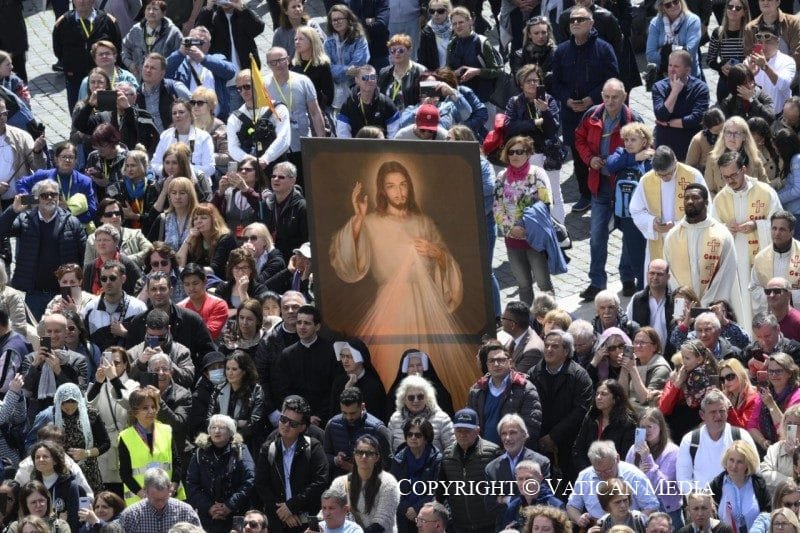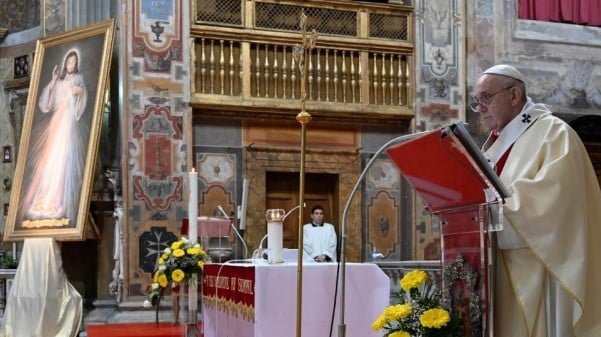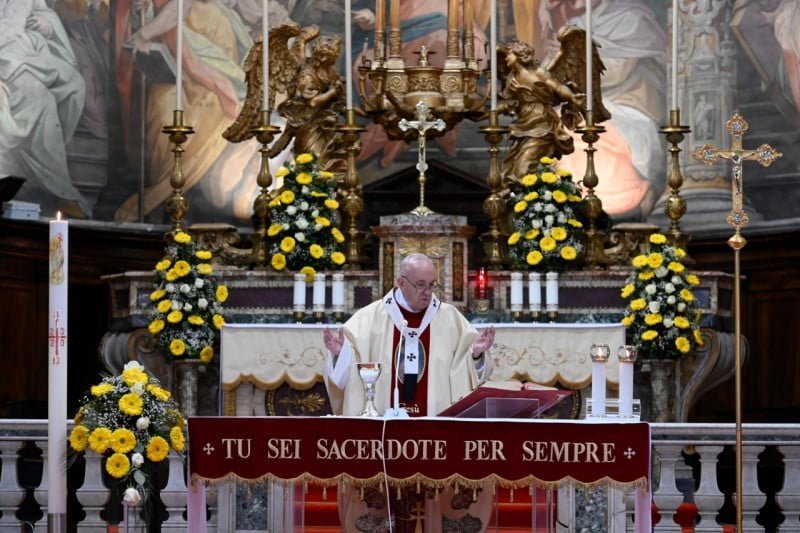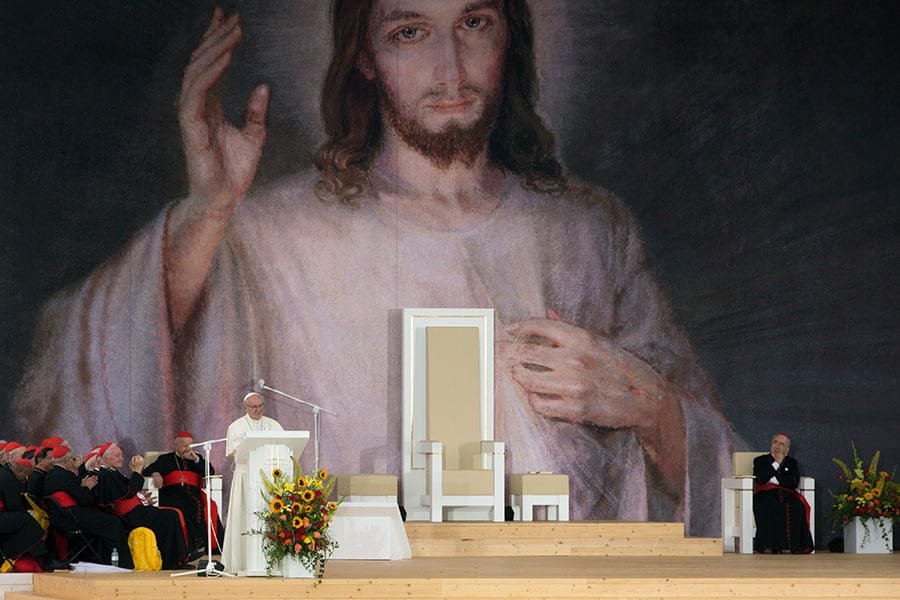POPE FRANCIS ON DIVINE MERCY SUNDAY YEAR A

REGINA CAELI
Saint Peter’s Square
Divine Mercy Sunday, 16 April 2023
Dear brothers and sisters, buongiorno!
Today, Divine Mercy Sunday, the Gospel recounts two apparitions of the Risen Jesus to his disciples, and in particular, to Thomas, the “doubting Apostle” (cf. Jn 20:24-29).
In reality, Thomas is not the only one who struggled to believe. In fact, he represents all of us a little bit. Indeed, it is not always easy to believe, especially when, as in his case, he had suffered a tremendous disappointment. And after such a huge disappoint, it was difficult to believe. He had followed Jesus for years, running risks, and enduring discomforts. But the Teacher had been put on a cross like a criminal, and no one had freed him. No one had done anything! He was dead and everyone was afraid. How could he trust again? How he could trust such news that said he was alive? There was a doubt inside him.
Thomas, however, shows that he was courageous. While the others had closed themselves inside the Upper Room out of fear, he went out, running the risk that someone might recognize, report and arrest him. We could even think that, with his courage, he would have deserved more than the others to meet the Risen Lord. Instead, precisely because he had been away, Thomas was not there when Jesus had appeared the first time to the disciples on Easter evening, thus losing that opportunity. He had gone away from the community. How could he retrieve the opportunity? Only by going back with the others, returning to that family he had left behind, scared and sad. When he does so, when he returns, they tell him that Jesus had come, but he struggles to believe – he wants to see his wounds. And Jesus satisfies him: eight days later, he appears again in the midst of his disciples and shows them his wounds, his hands, his feet, these wounds that are the proof of his love, that are the ever-open channels of his mercy.
Let us reflect on these facts. In order to believe, Thomas wants an extraordinary sign – to touch the wounds. Jesus shows them to him, but in an ordinary way, coming in front of everyone, in the community, not outside. It’s as if he said to him: if you want to meet me, do not look far away, remain in the community, with the others. Don’t go away…pray with them…break bread with them. And he says this to us as well.That is where you will find me; that is where I will show you the signs of the wounds impressed on my body: the signs of the Love that overcomes hatred, of the Pardon that disarms revenge, the signs of the Life that conquers death. It is there, in the community, that you will discover my face, as you share moments of doubt and fear with your brothers and sisters, clinging even more strongly to them. Without the community, it is difficult to find Jesus.
Dear brothers and sisters, the invitation given to Thomas is valid for us as well. We, where do we seek the Risen One? In some special event, in some spectacular or amazing religious manifestation, solely at the emotional or sensational level? Or rather in the community, in the Church, accepting the challenge of staying there, even though it is not perfect? Despite all of its limitations and failures, which are our limitations and failings, our Mother Church is the Body of Christ. And it is there, in the Body of Christ, that, now and forever, the greatest signs of his love can be found impressed. Let us ask ourselves, however, if in the name of this love, in the name of Jesus’s wounds, whether we are willing to open our arms to those who are wounded by life, excluding no one from God’s mercy, but welcoming everyone – each person like a brother, like a sister, like God welcomes everyone. God welcomes everyone.
May Mary, the Mother of Mercy, help us to love the Church and to make her a welcoming home for everyone.
Source: https://www.vatican.va/content/francesco/en/angelus/2023/documents/20230416-regina-caeli.html
Copyright © Dicastero per la Comunicazione – Libreria Editrice Vaticana
HOMILY OF HIS HOLINESS
POPE FRANCIS
Church of Santo Spirito in Sassia
2nd Sunday of Easter Year A, 19 April 2020

Last Sunday we celebrated the Lord’s resurrection; today we witness the resurrection of his disciple. It has already been a week, a week since the disciples had seen the Risen Lord, but in spite of this, they remained fearful, cringing behind “closed doors” (Jn 20:26), unable even to convince Thomas, the only one absent, of the resurrection. What does Jesus do in the face of this timorous lack of belief? He returns and, standing in the same place, “in the midst” of the disciples, he repeats his greeting: “Peace be with you!” (Jn 20:19, 26). He starts all over. The resurrection of his disciple begins here, from this faithful and patient mercy, from the discovery that God never tires of reaching out to lift us up when we fall. He wants us to see him, not as a taskmaster with whom we have to settle accounts, but as our Father who always raises us up. In life we go forward tentatively, uncertainly, like a toddler who takes a few steps and falls; a few steps more and falls again, yet each time his father puts him back on his feet. The hand that always puts us back on our feet is mercy: God knows that without mercy we will remain on the ground, that in order to keep walking, we need to be put back on our feet.
You may object: “But I keep falling!”. The Lord knows this and he is always ready to raise you up. He does not want us to keep thinking about our failings; rather, he wants us to look to him. For when we fall, he sees children needing to be put back on their feet; in our failings he sees children in need of his merciful love. Today, in this church that has become a shrine of mercy in Rome, and on this Sunday that Saint John Paul II dedicated to Divine Mercy twenty years ago, we confidently welcome this message. Jesus said to Saint Faustina: “I am love and mercy itself; there is no human misery that could measure up to my mercy” (Diary, 14 September 1937). At one time, the Saint, with satisfaction, told Jesus that she had offered him all of her life and all that she had. But Jesus’ answer stunned her: “You have not offered me the thing is truly yours”. What had that holy nun kept for herself? Jesus said to her with kindness: “My daughter, give me your failings” (10 October 1937). We too can ask ourselves: “Have I given my failings to the Lord? Have I let him see me fall so that he can raise me up?” Or is there something I still keep inside me? A sin, a regret from the past, a wound that I have inside, a grudge against someone, an idea about a particular person… The Lord waits for us to offer him our failings so that he can help us experience his mercy.
Let us go back to the disciples. They had abandoned the Lord at his Passion and felt guilty. But meeting them, Jesus did not give a long sermon. To them, who were wounded within, he shows his own wounds. Thomas can now touch them and know of Jesus’ love and how much Jesus had suffered for him, even though he had abandoned him. In those wounds, he touches with his hands God’s tender closeness. Thomas arrived late, but once he received mercy, he overtook the other disciples: he believed not only in the resurrection, but in the boundless love of God. And he makes the most simple and beautiful profession of faith: “My Lord and my God!” (v. 28). Here is the resurrection of the disciple: it is accomplished when his frail and wounded humanity enters into that of Jesus. There, every doubt is resolved; there, God becomes my God; there, we begin to accept ourselves and to love life as it is.

Dear brothers and sisters, in the time of trial that we are presently undergoing, we too, like Thomas, with our fears and our doubts, have experienced our frailty. We need the Lord, who sees beyond that frailty an irrepressible beauty. With him we rediscover how precious we are even in our vulnerability. We discover that we are like beautiful crystals, fragile and at the same time precious. And if, like crystal, we are transparent before him, his light – the light of mercy – will shine in us and through us in the world. As the Letter of Peter said, this is a reason for being “filled with joy, though now for a little while you may have to suffer various trials” (1 Pt 1:6).
On this feast of Divine Mercy, the most beautiful message comes from Thomas, the disciple who arrived late; he was the only one missing. But the Lord waited for Thomas. Mercy does not abandon those who stay behind. Now, while we are looking forward to a slow and arduous recovery from the pandemic, there is a danger that we will forget those who are left behind. The risk is that we may then be struck by an even worse virus, that of selfish indifference. A virus spread by the thought that life is better if it is better for me, and that everything will be fine if it is fine for me. It begins there and ends up selecting one person over another, discarding the poor, and sacrificing those left behind on the altar of progress. The present pandemic, however, reminds us that there are no differences or borders between those who suffer. We are all frail, all equal, all precious. May we be profoundly shaken by what is happening all around us: the time has come to eliminate inequalities, to heal the injustice that is undermining the health of the entire human family! Let us learn from the early Christian community described in the Acts of the Apostles. It received mercy and lived with mercy: “All who believed were together and had all things in common; and they sold their possessions and goods and distributed them to all, as any had need” (Acts 2:44-45). This is not some ideology: it is Christianity.
In that community, after the resurrection of Jesus, only one was left behind and the others waited for him. Today the opposite seems to be the case: a small part of the human family has moved ahead, while the majority has remained behind. Each of us could say: “These are complex problems, it is not my job to take care of the needy, others have to be concerned with it!”. Saint Faustina, after meeting Jesus, wrote: “In a soul that is suffering we should see Jesus on the cross, not a parasite and a burden… [Lord] you give us the chance to practise deeds of mercy, and we practise making judgements” (Diary, 6 September 1937). Yet she herself complained one day to Jesus that, in being merciful, one is thought to be naive. She said, “Lord, they often abuse my goodness”. And Jesus replied: “Never mind, don’t let it bother you, just be merciful to everyone always” (24 December 1937). To everyone: let us not think only of our interests, our vested interests. Let us welcome this time of trial as an opportunity to prepare for our collective future, a future for all without discarding anyone. Because without an all-embracing vision, there will be no future for anyone.
Today the simple and disarming love of Jesus revives the heart of his disciple. Like the apostle Thomas, let us accept mercy, the salvation of the world. And let us show mercy to those who are most vulnerable; for only in this way will we build a new world.
© Copyright – Libreria Editrice Vaticana
SOURCE: VATICAN.VA
EMPHASIS MINE.

POPE FRANCIS ON DIVINE MERCY SUNDAY YEAR A.
REGINA CÆLI
Saint Peter’s Square
Divine Mercy Sunday Year A (2nd Sunday of Easter Year A), 23 April 2017
OUTLINE
- “In albis” Sunday in the Church’s Tradition
- Divine Mercy Sunday: The Risen Lord transmits to His Church her first task of proclaiming His Mercy in the forgiveness of sins which brings with it peace and joy as fruit of a renewed encounter with the Lord.
- Mercy opens the door of the mind and of the heart. It is the turnkey of faith and renders visible Christ’s Resurrection.
+++ADDRESS BEGINS HERE. FORMATTING AND TITLES MINE+++
Dear Brothers and Sisters, good morning!
1. “In albis” Sunday in the Church’s Tradition
We know that each Sunday we commemorate the Resurrection of the Lord Jesus, but in this period after Easter, Sunday takes on an even more illuminating significance. In the Tradition of the Church, this Sunday, the first after Easter, was called “[Domenica] in albis”. What does this mean? The expression is meant to recall the Rite performed by those who had received Baptism at the Easter Vigil. Each of them would receive a white garment — alba, bianca — to indicate their new dignity as children of God. This is still done today — infants are offered a small symbolic garment, while adults wear a proper one, as we saw at the Easter Vigil. In the past, that white garment was worn for a week, until this Sunday, from which the name in albis deponendis is derived, which means the Sunday on which the white garment is removed. In this way, when the white garment was removed, the neophytes would begin their new life in Christ and in the Church.
2. Divine Mercy Sunday: The Risen Lord transmits to His Church her first task of proclaiming His Mercy in the forgiveness of sins which brings with it peace and joy as fruit of a renewed encounter with the Lord.
There is something else. In the Jubilee of the Year 2000, Saint John Paul II established that this Sunday be dedicated to Divine Mercy. Truly, it was a beautiful insight: it was the Holy Spirit who inspired him in this way. Just a few months ago we concluded the Extraordinary Jubilee of Mercy, and this Sunday we are invited to always hold firmly to the grace which comes from God’s mercy. Today’s Gospel is the account of the Apparition of the Risen Christ to the disciples gathered in the Upper Room (cf. Jn 20:19-31). Saint John writes that after greeting his disciples, Jesus says to them: “As the Father has sent me, even so I send you”. After saying this, he makes the gesture of breathing on them and adds: “Receive the Holy Spirit. If you forgive the sins of any, they are forgiven” (vv. 21-23). This is the meaning of the mercy that is presented on the very day of Jesus’ Resurrection as the forgiveness of sins. The Risen Jesus passed on to his Church, as her first task, his own mission of bringing to all the concrete message of forgiveness. This is the first task: to announce forgiveness. This visible sign of his mercy brings with it peace of heart and joy of the renewed encounter with the Lord.
3. Mercy opens the door of the mind and of the heart. It is the turnkey of faith and renders visible Christ’s Resurrection.
Mercy in the light of Easter enables us to perceive it as a true form of awareness. This is important: mercy is a true form of awareness. We know that it is experienced through many forms. It is experienced through the senses, it is experienced through intuition, through reason and even other forms. Well, it can also be experienced in mercy, because mercy opens the door of the mind in order to better understand the mystery of God and of our personal existence. Mercy enables us to understand that violence, rancour, vengefulness have no meaning, and the first victim is whoever feels these sentiments, because he deprives himself of his own dignity. Mercy also opens the door of the heart and allows one to express closeness especially to those who are lonely and marginalized, because it makes them feel as brothers and sisters, and as children of one Father. It favours recognition of those who need consolation and helps one find the appropriate words so as to give comfort.
Brothers and sisters, mercy warms the heart and makes it sensitive to the needs of brothers and sisters with sharing and participation. Thus, mercy requires everyone to be instruments of justice, reconciliation and peace. Let us never forget that mercy is the keystone in the life of faith, and the concrete form by which we make Jesus’ Resurrection visible.
May Mary, Mother of Mercy, help us to believe and joyfully experience all this.
Source: https://www.vatican.va/content/francesco/en/angelus/2017/documents/papa-francesco_regina-coeli_20170423.html

HOLY MASS AND RITE OF CANONIZATION OF BLESSEDS JOHN XXIII AND JOHN PAUL II
HOMILY OF POPE FRANCIS
St. Peter’s Square
2nd Sunday of Easter Year A (Divine Mercy Sunday Year A), 27 April 2014
At the heart of this Sunday, which concludes the Octave of Easter and which Saint John Paul II wished to dedicate to Divine Mercy, are the glorious wounds of the risen Jesus.
He had already shown those wounds when he first appeared to the Apostles on the very evening of that day following the Sabbath, the day of the resurrection. But, as we have heard, Thomas was not there that evening, and when the others told him that they had seen the Lord, he replied that unless he himself saw and touched those wounds, he would not believe. A week later, Jesus appeared once more to the disciples gathered in the Upper Room. Thomas was also present; Jesus turned to him and told him to touch his wounds. Whereupon that man, so straightforward and accustomed to testing everything personally, knelt before Jesus with the words: “My Lord and my God!” (Jn 20:28).
The wounds of Jesus are a scandal, a stumbling block for faith, yet they are also the test of faith. That is why on the body of the risen Christ the wounds never pass away: they remain, for those wounds are the enduring sign of God’s love for us. They are essential for believing in God. Not for believing that God exists, but for believing that God is love, mercy and faithfulness. Saint Peter, quoting Isaiah, writes to Christians: “by his wounds you have been healed” (1 Pet 2:24, cf. Is 53:5).
Saint John XXIII and Saint John Paul II were not afraid to look upon the wounds of Jesus, to touch his torn hands and his pierced side. They were not ashamed of the flesh of Christ, they were not scandalized by him, by his cross; they did not despise the flesh of their brother (cf. Is 58:7), because they saw Jesus in every person who suffers and struggles. These were two men of courage, filled with the parrhesia of the Holy Spirit, and they bore witness before the Church and the world to God’s goodness and mercy.
They were priests, and bishops and popes of the twentieth century. They lived through the tragic events of that century, but they were not overwhelmed by them. For them, God was more powerful; faith was more powerful – faith in Jesus Christ the Redeemer of man and the Lord of history; the mercy of God, shown by those five wounds, was more powerful; and more powerful too was the closeness of Mary our Mother.
In these two men, who looked upon the wounds of Christ and bore witness to his mercy, there dwelt a living hope and an indescribable and glorious joy (1 Pet 1:3,8). The hope and the joy which the risen Christ bestows on his disciples, the hope and the joy which nothing and no one can take from them. The hope and joy of Easter, forged in the crucible of self-denial, self-emptying, utter identification with sinners, even to the point of disgust at the bitterness of that chalice. Such were the hope and the joy which these two holy popes had received as a gift from the risen Lord and which they in turn bestowed in abundance upon the People of God, meriting our eternal gratitude.
This hope and this joy were palpable in the earliest community of believers, in Jerusalem, as we have heard in the Acts of the Apostles (cf. 2:42-47). It was a community which lived the heart of the Gospel, love and mercy, in simplicity and fraternity.
This is also the image of the Church which the Second Vatican Council set before us. John XXIII and John Paul II cooperated with the Holy Spirit in renewing and updating the Church in keeping with her pristine features, those features which the saints have given her throughout the centuries. Let us not forget that it is the saints who give direction and growth to the Church. In convening the Council, Saint John XXIII showed an exquisite openness to the Holy Spirit. He let himself be led and he was for the Church a pastor, a servant-leader, guided by the Holy Spirit. This was his great service to the Church; for this reason I like to think of him as the the pope of openness to the Holy Spirit.
In his own service to the People of God, Saint John Paul II was the pope of the family. He himself once said that he wanted to be remembered as the pope of the family. I am particularly happy to point this out as we are in the process of journeying with families towards the Synod on the family. It is surely a journey which, from his place in heaven, he guides and sustains.
May these two new saints and shepherds of God’s people intercede for the Church, so that during this two-year journey toward the Synod she may be open to the Holy Spirit in pastoral service to the family. May both of them teach us not to be scandalized by the wounds of Christ and to enter ever more deeply into the mystery of divine mercy, which always hopes and always forgives, because it always loves.
SEE AS WELL:
2nd Sunday of Easter, DIVINE MERCY SUNDAY MASS PRAYERS AND READINGS, YEAR A in https://www.catholicsstrivingforholiness.org/2nd-sunday-of-easter-divine-mercy-sunday-mass-readings/
Stay updated: subscribe by email for free TO OUR NEW WEBSITE www.catholicsstrivingforholiness.org (PUT YOUR EMAIL IN THE SUBSCRIBE WIDGET).
We are also in www.fb.com/Catholicsstrivingforholiness. Kindly help more people in their Christian life by liking our page and inviting your family, friends and relatives to do so as well. Thanks in advance and God bless you and your loved ones! Fr. Rolly Arjonillo
